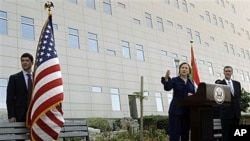U.S. Secretary of State Hillary Clinton, continuing a tour of Gulf states, said sanctions and technical problems apparently have slowed what U.S. officials believe is a nuclear weapons drive by Iran.
Clinton’s comments, on a popular Abu Dhabi womens’ television program, appeared to confirm recent Israeli assessments that Iran may not have a nuclear weapons capability for another three or four years.
Clinton nonetheless urged Arab Gulf states, some of which have lucrative trading ties with Iran, to stiffen their enforcement of U.N. nuclear sanctions, warning that a nuclear-armed Iran would set off a regional arms race.
In her TV appearance, which came in between rounds of meetings with leaders in Abu Dhabi and Dubai of the United Arab Emirates, the Secretary rejected an assertion from a program host that sanctions against Tehran have been a failure.
"The sanctions have been working," said Clinton. "They have made it much more difficult for Iran to pursue its nuclear ambitions. Iran’s had technological problems that have made it slow down its timetable. So we do see some problems within Iran. But the real question is how do we convince Iran that pursuing nuclear weapons will not make it safer and stronger, but just the opposite."
Clinton defended U.S. efforts to resolve the Israeli-Palestinian conflict, and urged Gulf states to do more to foster Palestinian economic stability and to persuade Israelis that making peace with the Palestinians will actually deliver the normal relations promised in the 2002 Arab League place plan.
She said Iran, on the other hand, would prefer to keep tensions high through its regional proxies to divert attention from its nuclear ambitions.
"There is very little doubt that Iran does not want to see any kind of negotiated peace between the Israelis and Palestinians," said Clinton. "For its own purposes, it wants to keep attention off of what is the big concern for the future, which is a nuclear-armed Iran, with weapons that threaten its neighbors and beyond. So if they can shift attention away from their own internal decisions about whether or not to pursue and produce nuclear weapons, they will be very happy about that."
Clinton said the Obama administration is working "all the time" to try to get a two-state solution to the Middle East conflict. She said the United States and Gulf allies cannot let "any outside influence" foment a disastrous regional conflict.
The Secretary’s schedule includes stops later this week in Oman and Qatar, where Clinton will discuss Sudan peace efforts with Qatari officials who have been helping mediate Darfur settlement efforts.
In her Abu Dhabi TV appearance, Clinton hailed the courage of the Sudanese government in allowing the south Sudan independence referendum, and said both north and south deserve international support as they implement the verdict of the historic vote.
















